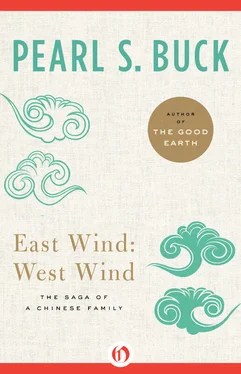“Wait yet another hour until my son’s father comes home that I may open the letter before him and know what he would bid me do. I will ask permission to go to my mother. Meanwhile, eat rice and meat for your refreshment.”
She willingly agreed, and I gave orders that an extra bit of pork be placed before her, taking my comfort in consoling her thus for her share in our family calamity.
In my room awaiting my husband’s return I mused alone. I remembered my brother. Try as I might, I could not see him as he is now, grown a man, dressed in American clothes, walking fearlessly about the strange roadways of that far country, speaking, perhaps, to its men and women — nay, certainly this, since one woman he loves. I could only look into my mind and remember him as I knew him best, the little elder brother of my childhood, he with whom I played at the threshold of the gates into the courts.
Then he was a head taller than I, quick to move, excited in speech, eager after laughter. His face was like our mother’s, oval, its lips straight and fine, and the brows clearly marked above the pointed eyes. The older concubines were always jealous because he was more beautiful than their sons. Yet how could he be otherwise? They were but common women, slaves in their youth, their lips full and coarse, and their eyebrows scattered like dog’s hairs. But our mother was a lady of a hundred generations. Her beauty was the beauty of precision and delicacy, full of restraint in line and color. This beauty she had bestowed upon her son.
Not that he cared for it. He brushed aside impatiently the caressing fingers of the women slaves upon his smooth cheeks, when they flattered him to try to please his mother. He was intent upon his own play. But indeed, he was intense even in play and laughter. I seem to see him always with knitted brows above his play. He was filled with resolution over everything, and he would brook no will over his own.
When we played together I dared not cross him, partly because he was a boy, and it would not have been seemly that I, a girl, should set my will against his. But I let him have his way most of all because I loved him greatly and could not see him grieve.
Indeed, no one could bear to see him crossed. The servants and the slaves revered him as the young lord, and even the dignity of our mother was softened in his presence. I do not mean that she ever allowed him actually to disobey her commands, but I think she often restrained herself so that what she commanded of him would be in accord with his wishes. I have heard her bid a slave remove a certain sweet oil cake from the table before he came in, because he loved it and would eat it, and it always made him ill; and lest seeing it he would desire it, and she be compelled to refuse it to him.
Even as a youth his life was thus made smooth before him. It did not occur to me to mark the difference made between him and me. I did not at any time dream of being on an equality with my brother. It was not necessary. I had no such important part to fulfill in the family as he, the first son and the heir of my father.
Always in those days I loved my brother above all others. I walked by his side in the gardens, clinging to his hand. Together we stooped above the shallow pools, searching in the green shadows for the particular goldfish we called our own. Together we collected little stones of varied colors and built fairy courts patterned after our own courts, only infinitely small and intricate in design. When he taught me to move my brush carefully over the outlined characters of my first writing book, guiding my hand with his own placed over it, I considered him the wisest of human beings. Wherever he went in the women’s courts, I followed behind him like a little dog, and if he went beyond the arched gate into the men’s apartments where I could not go, I stood patiently there waiting until he returned.
Then suddenly he was nine years old, and he was taken from the women’s apartments into those of his father and the men, and our life together was broken sharply off.
Oh, those first few days! I could not live through them without long fits of weeping. At night I wept myself to sleep and dreamed of a place where we were always children and never separated. Ah, it was many a day before I ceased to mope about, seeing every room empty without him. My mother at length feared for my health and spoke to me.
“My daughter, this constant longing for your brother is unseemly. Such emotion must be reserved for other relationships. Grief like this is fit only for the death of your husband’s parents. Perceive the proportions of life and restrain yourself, therefore. Apply yourself to your studies and to your embroidery. The time has now come when we must fit you seriously for your marriage.”
Thereafter the idea of my approaching marriage was held always before me. I grew to understand that my life and my brother’s could never go side by side. I did not belong primarily to his family, but to the family of my betrothed. I heeded my mother’s words, therefore, and resolutely applied myself to my duties.
I remember my brother again clearly on that day when he desired to go to Peking to school. He came into our mother’s presence to ask her formal permission, and I was there. Since he had already obtained our father’s consent, his coming to our mother was only a courtesy. Our mother could scarcely forbid what our father allowed. But my brother was always scrupulous in the observance of proper outward custom.
He stood before her clad in a thin gray silk gown, for it was summer. Upon his thumb was a ring of jade. My brother is ever a lover of beautiful things. That day he made me think of a silver reed for grace. He held his head drooping a little before our mother, his eyes cast down. But from where I sat I could see his eyes gleaming between the lids.
“My mother,” he said, “if you are willing, I should like to study further at the university in Peking.”
She knew of course that she must consent. He knew that she would have forbidden it if she could. But where another would have dallied with complaining and weeping, she spoke at once quietly and firmly.
“My son, you know it must be as your father says. I am nothing but your mother — I know it. Nevertheless, I will speak, even though I may not now command against your father’s will. I see no use in your leaving home. Your father and your grandfather completed their learning at home. You yourself have had the most skilled scholars in the city to teach you from your childhood. We even procured T’ang, the Learned, from Szechuen to instruct you in poetry. This foreign learning is unnecessary for one in your position. Going to these far cities you imperil your life, which is not fully yours until you have given us a son to carry on the ancestral name. If you could have married first—”
My brother stirred angrily and shut his fan, which he had been holding open in his left hand. Then he opened it quickly again with a snap. He lifted his eyes, and from under their lids protest leaped out. My mother raised her hand.
“Do not speak, my son. I do not command yet. I only warn you. Your life is not your own. Take care of it.”
She bowed her head, and he was dismissed.
I saw him after that but rarely. He came home only twice before my marriage, and we had nothing to say to each other, and we were never alone together. Nearly always he came into the women’s courts merely to give his mother formal greeting or to bid her farewell, and I could not speak to him freely in the presence of an elder.
I saw only that he grew tall and erect in bearing, and his face lost some of its youthful delicacy. He lost, too, the slender, childish, drooping grace of his body that in his early years had given him the look almost of a handsome girl. I heard him tell my mother that in the foreign type of school he had to exercise his body daily, and thus it grew in height and thickness and sinew. His hair he cut off according to the new fashion at the time of the first revolution, and it was smooth and black against his lifted head. I saw that he was beautiful. The women in the courts sighed after him, and the fat Second Lady murmured,
Читать дальше











